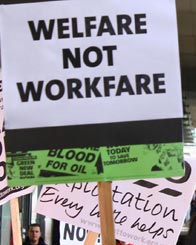Similar topics:
Attached documents
 RAIL UNION RMT today reaffirmed its total opposition to “workfare” schemes on the railways, where claimants are forced to work for benefits, after suggestions emerged that Southern may be engaging in such a scheme.
RAIL UNION RMT today reaffirmed its total opposition to “workfare” schemes on the railways, where claimants are forced to work for benefits, after suggestions emerged that Southern may be engaging in such a scheme.
RMT General Secretary Bob Crow said:
“RMT is investigating reports from our branches that Southern may be in the process of rolling out a “workfare” scheme and we are demanding assurances from the company that any such plan would be dropped immediately.
“This is not the first time that “workfare” has been raised as a possibility on the railways and with this government’s attacks on the welfare state we doubt that it will be the last.
“RMT remains totally and implacably opposed to the idea of “workfare” on the railways as a way of using claimants as cheap labour and at the same time driving down the pay and conditions of permanent staff.
“RMT is investigating the position on Southern and monitoring developments in other parts of the country and the union will fight any “workfare” plans tooth and nail.”
- Press releases on this site are taken from www.rmt.org.uk.
- 17955 reads
> RMT National News
- 1 of 10
- next ›





